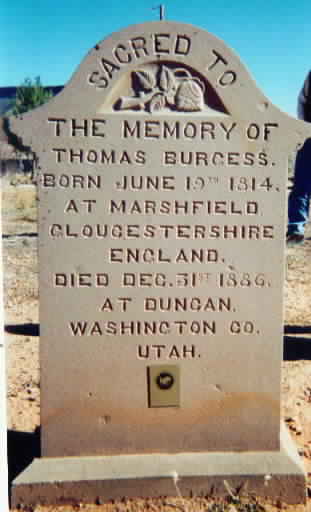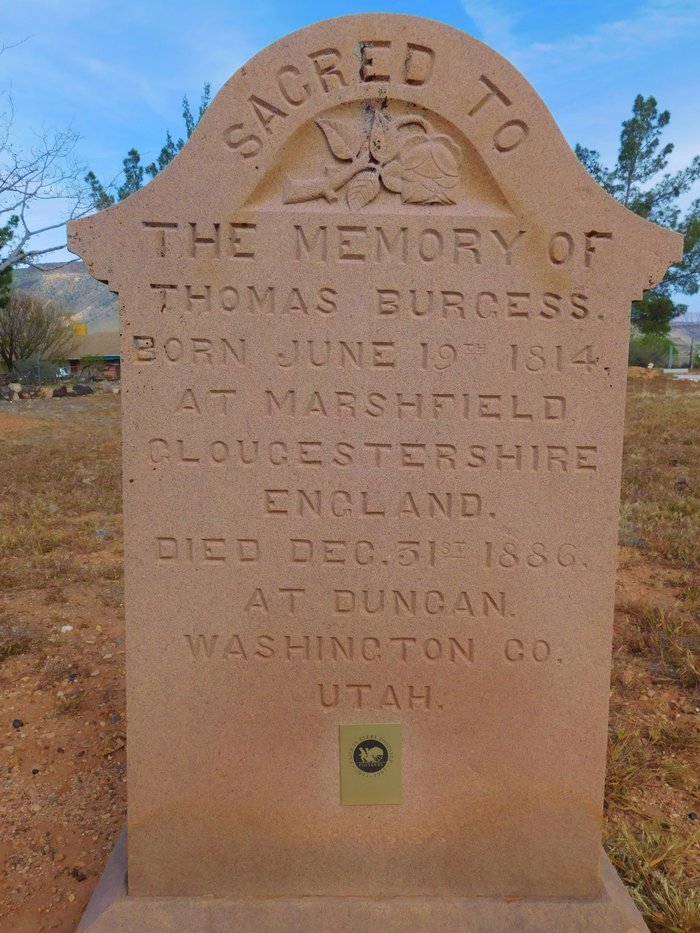Married Elizabeth Isaac, 19 Jun 1842, Marshfield, Gloucester, England
Children - Ann Elizabeth Burgess, Emma Burgess, Jane Burgess
History - Mormon Church President Brigham Young called hundreds of families to relocate to southwestern Utah to help establish a Cotton Mission. Thomas Burgess and his extended family arrived along the Virgin River around December 1, 1861, and camped between the new towns of Duncan and Grafton while they waited for a draw of land.
A tremendous rain began to drench the area. The Virgin River and its tributaries all ran high floods that obliterated the first colonizing attempt at Grafton and swept away much of the land at Virgin City and Rockville. Houses, furniture, clothing, and other property from Grafton floated down the river.
The Nathan Tenney family was camped at Grafton in a wagon box where Nathan's wife was in labor. To make matters worse the wagon was dangerously close to the surging river. In an effort to keep her and the wagon from being swept into the river, the men of the town lifted the entire box, Mrs. Tenney included, to higher ground. Fortunately, despite all the commotion, she had a successful delivery, and the proud parents named their son Marvelous Flood Tenney.
Even though the first settlers of Duncan's Retreat did not face nearly the excitement the Tenneys had, the flood still proved too great a challenge; they sold their claims to the Burgess family and nine others. The ensuing years did not prove untroubled for them either, as the river continued to take its toll.
One Duncan's Retreat resident described their difficulties: "At the present time, 1866, there is not more than one half the bottom land left that was here when we, came, but we have been told...to hold our positions as long as possible."
In addition to the unpredictable river, residents also experienced difficulties with Indians during the Black Hawk War.
History to Go
Married Elizabeth Isaac, 19 Jun 1842, Marshfield, Gloucester, England
Children - Ann Elizabeth Burgess, Emma Burgess, Jane Burgess
History - Mormon Church President Brigham Young called hundreds of families to relocate to southwestern Utah to help establish a Cotton Mission. Thomas Burgess and his extended family arrived along the Virgin River around December 1, 1861, and camped between the new towns of Duncan and Grafton while they waited for a draw of land.
A tremendous rain began to drench the area. The Virgin River and its tributaries all ran high floods that obliterated the first colonizing attempt at Grafton and swept away much of the land at Virgin City and Rockville. Houses, furniture, clothing, and other property from Grafton floated down the river.
The Nathan Tenney family was camped at Grafton in a wagon box where Nathan's wife was in labor. To make matters worse the wagon was dangerously close to the surging river. In an effort to keep her and the wagon from being swept into the river, the men of the town lifted the entire box, Mrs. Tenney included, to higher ground. Fortunately, despite all the commotion, she had a successful delivery, and the proud parents named their son Marvelous Flood Tenney.
Even though the first settlers of Duncan's Retreat did not face nearly the excitement the Tenneys had, the flood still proved too great a challenge; they sold their claims to the Burgess family and nine others. The ensuing years did not prove untroubled for them either, as the river continued to take its toll.
One Duncan's Retreat resident described their difficulties: "At the present time, 1866, there is not more than one half the bottom land left that was here when we, came, but we have been told...to hold our positions as long as possible."
In addition to the unpredictable river, residents also experienced difficulties with Indians during the Black Hawk War.
History to Go
Family Members
Advertisement
Explore more
Sponsored by Ancestry
Advertisement











